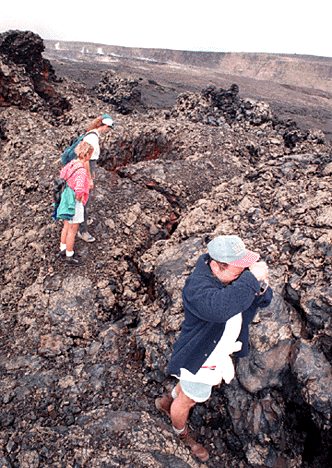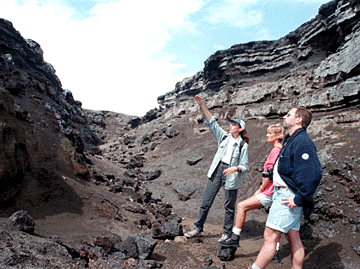



But the two Kauai men are finding it isn't easy to get the permits they need to offer hiking tours in state parks and forest reserves.
That's because the state Department of Land and Natural Resources has no agencywide policy or rules governing commercial activities on the public lands it oversees.
"They are pushing us before we've got our act together, and we don't honestly know how to deal with it," said Ed Petteys, Kauai manager of the state Division of Forestry and Wildlife.
 Still, the state is slowly moving to bring the burgeoning ecotourism industry under control, raising questions about whether Hawaii's beaches, streams, forests and parks can survive contact with hordes of nature-loving tourists. And, asks state land board chief Michael D. Wilson, are local residents willing to share these special places with even more visitors?
Still, the state is slowly moving to bring the burgeoning ecotourism industry under control, raising questions about whether Hawaii's beaches, streams, forests and parks can survive contact with hordes of nature-loving tourists. And, asks state land board chief Michael D. Wilson, are local residents willing to share these special places with even more visitors?
Tourism officials and state land managers say it's impossible to know how many more are operating seasonally, part-time or informally for cash. And some businesses that primarily provide lodging or equipment rentals may also offer tours on the side.
Petteys, alarmed by an increase in unpermitted ecotourism ventures, was the driving force behind a panel created 18 months ago to find ways of managing commercial activities on public lands.
The committee has devised a commercial activities permit application process that is being reviewed by the state attorney general. The proposal likely will go to public review in late May or early June, Wilson said.
Petteys wishes Pratt and Berg would wait until the policy is adopted before seeking permits. But the two men said they are moving ahead now because they want to ensure the state does regulate their industry.
Berg and Pratt are dismayed at the way commercial tour boats and helicopters have proliferated with virtually no state controls, and they worry the same thing is happening with the hiking, bicycling and kayaking excursions that comprise the bulk of their industry.
"I'm the forerunner of this massive movement, and I just hope it doesn't prove disastrous to the environment and my culture," said Pratt, whose Local Boy Tours was the first in the state to win a conservation district use permit to lead hiking and camping tours into Hawaii's back country.
Pratt later abandoned that venture for other work, but in 1995 began seeking state approval to resume his tours. The state, meanwhile, had determined its conservation district permit process pertained only to uses, such as home-building, and not activities. State land managers directed first Pratt and then Berg to prepare environmental assessments.
The two have completed the process, which took more than a year, and are waiting for public comment.

"A lot of guys are wanting to get in while we're still struggling through this lengthy process to clarify this deep hole," Petteys said.
While many tourism officials see ecotourism as a way to stabilize or revitalize Hawaii's stagnant visitor industry, state land managers are worried that their overused resources and understaffed agencies will be swamped.
Already the Department of Business, Economic Development and Tourism has worked to exempt the film industry from the new rules, exposing an old conflict between state agencies over whether economic or environmental considerations should prevail in public land use decisions.
"Ecotourism could be the tail that wags the dog," said Betsy Gagne, executive director of the state Natural Area Reserves System. "We're worried it's just going to get out of control."
Janis Togashi, DBEDT communications director, said the agency prefers its current, more flexible, system of getting permission for film crews to use state lands, although it supports the proposed permit process for other activities.
Chelle Shand, whose Big Island-based International Society for Eco-Tourism Management favors the state's proposed permitting process, said Hawaii's private lands, too, are being heavily impacted by bootleg tour operators. She estimates the numbers are "in the hundreds" on the Big Island alone, running the gamut from fully-insured, well-informed guides to residents "who put people in the back seat of their car and drive them around and collect money."
Petteys said he had no idea how many operators were on Kauai, although he is certain "there will be more people than resources, so we may need to do a lottery or maybe a bidding process" to award permits.
Berg agreed that ecotourists want to avoid well-traveled routes, a desire that could conflict with the state's plan to funnel commercial activities onto certain trails and rivers.
Pratt said many areas on Kauai are overused and fail to offer the natural experience some ecotourists are seeking, and Shand said some international operators already shun Hawaii because true wilderness is lacking.
Pratt and Berg said the state has asked them to provide services, such as wildlife monitoring and trail improvement, as a condition of their permits. The proposed rules also could require operators to pay $75 a month or 10 percent of their gross revenues.
They want the state to spend some of that money fixing park restrooms, campgrounds and other outdoor facilities.
Wilson said the state, which ranks 48th in the nation in fish and wildlife agency funding, already is failing to manage its key resources so they can be sustained.
The Department of Land and Natural Resources cannot handle a big surge in ecotourism given its present funding and staffing level, he said.
Still, Wilson is hopeful that the new emphasis on ecotourism will help legislators see the link between Hawaii's unique natural environment and its $11 billion tourism trade.
"I think they're starting to understand that industry is going to erode unless we change our funding patterns for resource protection," Wilson said.

That can be part of it. But to accurately wear the ecotourism label, industry officials say the experience must also include sustainability, cultural compatibility, education, ecological responsibility, community benefit and aloha aina.
And it's often done with the goal of making the ecotourist more committed to the protection of natural areas and indigenous cultures.
That's different from Hawaii's mass -- or beach -- tourism, which is centered around developed facilities and generally shy on authentic cultural activities and direct, interpreted contact with nature.
 But when it comes to enticing visitors (who spent some $669 million on nature-based travel to Hawaii in 1993), the definition of ecotourism gets a little fuzzy.
But when it comes to enticing visitors (who spent some $669 million on nature-based travel to Hawaii in 1993), the definition of ecotourism gets a little fuzzy.
The Ritz-Carlton Kapalua on Maui uses the phrase to promote its recycling program and nature hikes, even though construction of the resort caused relocation of some 1,000 ancient Hawaiian burials.
Several Na Pali Coast tour boat companies also bill themselves as ecotourist adventures, even though they operate without the required government permits. Some Kauai companies use the term to describe their practice of simply renting kayaks, with no guide service. And helicopters, frequently the target of conservationists, offer "eco-air tours."
Chelle Shand, director of the Big Island-based International Society for Eco-Tourism Management, said a permitting system will help the industry "gain standards of practice, so that people are operating responsibly."
Permitting could also provide a means of ensuring that guides are knowledgeable about Hawaii's natural world and don't perpetuate inappropriate or false cultural practices, such as leaving rocks wrapped in ti leaves as offerings, Shand said.
Education, another key component of ecotourism, could help take the pressure off enforcement efforts, said Jeff Bearman, state boating manager for Kauai. Both visitors and operators need to be better informed about Hawaii's natural resources and what can be done to protect them, he said.
"People want to do the right thing," Bearman said. "They see this beautiful place and they respect it. I have a lot of hope because of that."